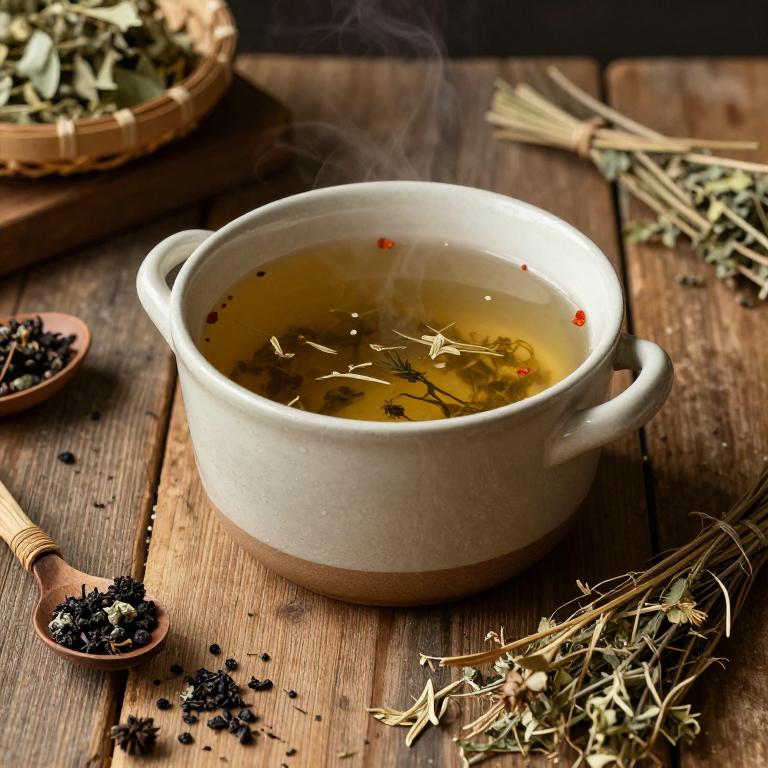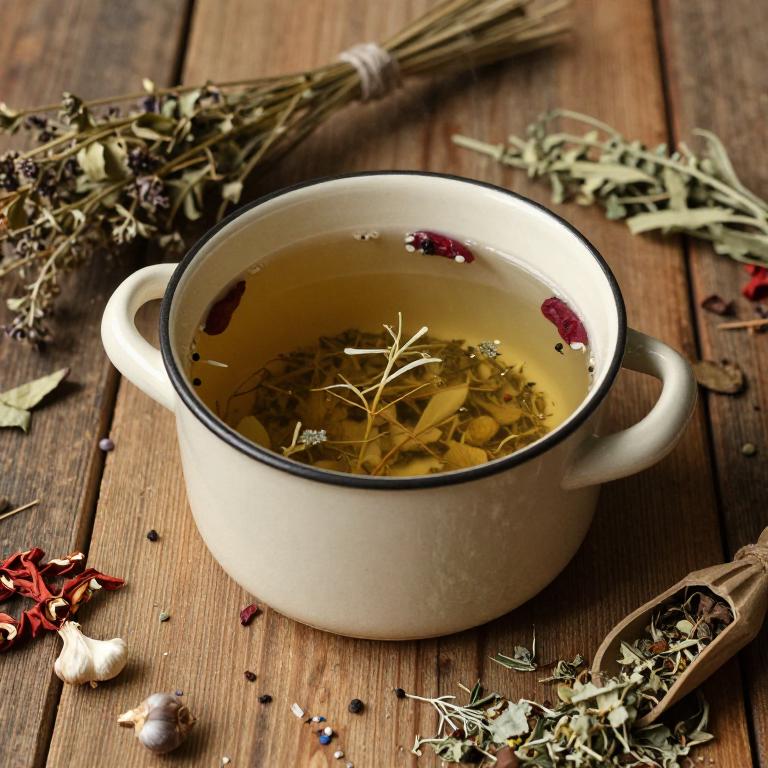10 Best Herbal Decoctions For Hoarse Voice

Herbal decoctions have been traditionally used to alleviate hoarse voice by soothing the throat and reducing inflammation.
Common herbs such as licorice root, marshmallow root, and sage are often included in these remedies due to their demulcent and anti-inflammatory properties. To prepare a decoction, these herbs are simmered in water for an extended period to extract their active compounds. Drinking the decoction warm can help lubricate the vocal cords and ease vocal strain.
While generally safe, it is advisable to consult a healthcare provider before using herbal remedies, especially for prolonged or severe hoarseness.
Table of Contents
- 1. Stinging nettle (Urtica dioica)
- 2. Echinacea (Echinacea purpurea)
- 3. Licorice (Glycyrrhiza glabra)
- 4. Thyme (Thymus vulgaris)
- 5. Chaste tree (Vitex agnus-castus)
- 6. Ginger (Zingiber officinale)
- 7. Salvia (Salvia officinalis)
- 8. Black elderberry (Sambucus nigra)
- 9. Fennel (Foeniculum vulgare)
- 10. Chamomile (Matricaria chamomilla)
1. Stinging nettle (Urtica dioica)

Urtica dioica, commonly known as stinging nettle, has been traditionally used in herbal medicine for its potential soothing properties.
When prepared as a decoction, the roots of Urtica dioica are simmered in water to extract their active compounds, which may help alleviate symptoms of a hoarse voice. This herbal remedy is believed to support throat health by reducing inflammation and promoting healing in the vocal cords. Some studies suggest that the high concentration of minerals and antioxidants in stinging nettle may contribute to its therapeutic effects.
However, it is important to consult a healthcare professional before using Urtica dioica, especially for prolonged periods or in combination with other medications.
2. Echinacea (Echinacea purpurea)

Echinacea purpurea, commonly known as purple coneflower, is a popular herbal remedy often used to support the immune system and reduce the duration of colds.
Its herbal decoctions, made by boiling the dried roots and leaves in water, have been traditionally used to soothe throat irritation and alleviate symptoms of hoarseness. While scientific evidence on its effectiveness for hoarse voice is limited, some studies suggest that echinacea may have anti-inflammatory and antimicrobial properties that could help reduce throat inflammation and infection. When used as a decoction, it is typically consumed several times a day, and it is often combined with other herbs like licorice root or sage for enhanced throat comfort.
However, individuals should consult a healthcare provider before using echinacea, especially if they have allergies or are taking other medications.
3. Licorice (Glycyrrhiza glabra)

Glycyrrhiza glabra, commonly known as licorice root, has been traditionally used in herbal medicine for its soothing properties, particularly for alleviating hoarse voice.
The herbal decoction of licorice root is prepared by boiling the dried root in water, resulting in a sweet-tasting liquid that can be consumed orally. This decoction is believed to reduce inflammation and irritation in the throat, thereby easing symptoms of hoarseness caused by conditions such as laryngitis or vocal strain. Its expectorant and demulcent properties help to loosen mucus and coat the throat, providing relief from dryness and discomfort.
However, long-term use of licorice root decoctions should be monitored due to potential side effects such as hypertension and electrolyte imbalances.
4. Thyme (Thymus vulgaris)

Thymus vulgaris, commonly known as thyme, has been traditionally used in herbal medicine for its potential benefits in treating hoarse voice.
The essential oils and compounds found in thyme, such as thymol and carvacrol, possess antimicrobial and anti-inflammatory properties that may help reduce throat irritation and infection. Herbal decoctions made from thyme can be prepared by steeping the dried leaves in hot water, creating a soothing tea that can be consumed several times a day. This remedy is often recommended for individuals experiencing vocal strain, coughing, or inflammation of the larynx.
While thyme is generally safe, it is advisable to consult a healthcare provider before using it, especially for those with allergies or existing medical conditions.
5. Chaste tree (Vitex agnus-castus)

Vitex agnus-castus, commonly known as chasteberry, has been traditionally used in herbal medicine for its potential to support hormonal balance and alleviate symptoms associated with hormonal fluctuations.
While it is more commonly associated with menstrual regulation and menopausal symptoms, some anecdotal evidence suggests it may help with hoarse voice by reducing inflammation and soothing the vocal cords. Herbal decoctions of vitex agnus-castus are typically prepared by simmering the dried berries in water for several hours, allowing the active compounds to be extracted. However, it is important to note that scientific research on its efficacy for hoarse voice is limited, and it should be used under the guidance of a qualified herbalist or healthcare provider.
As with any herbal remedy, individual responses may vary, and it should not replace professional medical advice for persistent or severe voice issues.
6. Ginger (Zingiber officinale)

Zingiber officinale, commonly known as ginger, has been traditionally used in herbal medicine for its anti-inflammatory and soothing properties.
When prepared as a decoction, ginger can help alleviate symptoms of a hoarse voice by reducing inflammation in the throat and promoting mucus clearance. The active compounds in ginger, such as gingerol and shogaol, contribute to its ability to ease irritation and support vocal cord health. To prepare the decoction, fresh ginger root is sliced and simmered in water for several minutes, allowing the beneficial compounds to infuse into the liquid.
Regular consumption of this herbal decoction may provide natural relief for individuals experiencing hoarseness due to vocal strain, colds, or other throat-related conditions.
7. Salvia (Salvia officinalis)

Salvia officinalis, commonly known as sage, has been traditionally used in herbal medicine for its soothing properties, particularly for addressing hoarse voice.
When prepared as a decoction, sage leaves are simmered in water to extract their beneficial compounds, including flavonoids and volatile oils, which possess anti-inflammatory and antimicrobial effects. This herbal decoction is believed to help reduce throat irritation and inflammation, thereby alleviating symptoms of hoarseness. It is often recommended for individuals with laryngitis or vocal strain, as it may support the healing of the vocal cords.
However, it is important to consult a healthcare professional before using sage decoctions, especially for prolonged periods or in combination with other treatments.
8. Black elderberry (Sambucus nigra)

Sambucus nigra, commonly known as elderberry, is traditionally used in herbal medicine for its potential soothing effects on the respiratory system.
Herbal decoctions made from the berries, flowers, or leaves of Sambucus nigra are often prepared by simmering the plant parts in water to extract their active compounds. These decoctions are believed to help alleviate symptoms of hoarse voice by reducing inflammation and supporting throat health. The high antioxidant content in elderberry may contribute to its effectiveness in calming irritated vocal cords.
While generally considered safe when used in moderation, it is important to consult a healthcare professional before using Sambucus nigra, especially for prolonged periods or in combination with other medications.
9. Fennel (Foeniculum vulgare)

Foeniculum vulgare, commonly known as fennel, has been traditionally used in herbal medicine for its potential benefits in treating hoarse voice.
The herbal decoction of fennel seeds is prepared by boiling the dried seeds in water, allowing the active compounds to infuse into the liquid. This decoction is believed to help soothe the throat and reduce inflammation, which may contribute to improving vocal clarity. The essential oils in fennel, such as anethole, are thought to have expectorant and antispasmodic properties that support respiratory health.
While some studies suggest fennel may offer relief for voice-related issues, it is advisable to consult a healthcare professional before using it as a treatment for persistent hoarseness.
10. Chamomile (Matricaria chamomilla)

Matricaria chamomilla, commonly known as chamomile, has been traditionally used for its calming and anti-inflammatory properties.
Herbal decoctions made from chamomile flowers can help soothe an irritated throat and reduce inflammation, which may contribute to hoarseness. The active compounds in chamomile, such as flavonoids and essential oils, have mild antiseptic and mucolytic effects that support throat health. To prepare a decoction, steep the dried flowers in hot water for several minutes, then strain and consume as needed.
While chamomile can be a helpful complementary remedy for a hoarse voice, it is advisable to consult a healthcare professional for persistent or severe vocal issues.